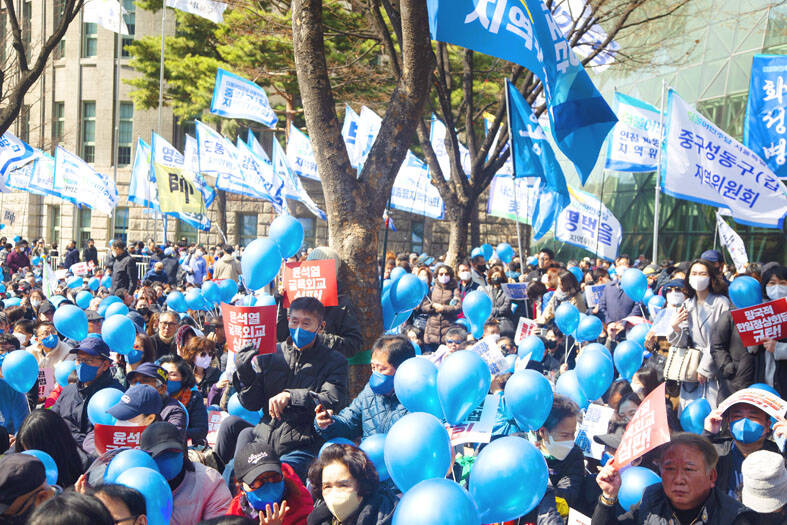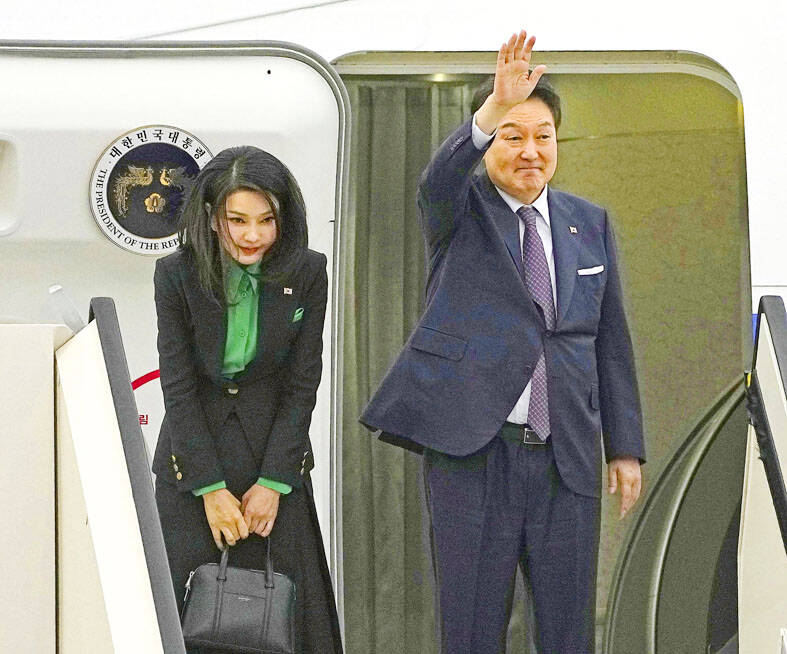South Korea is planning to fully implement a key military intelligence-sharing pact with Japan, a South Korean Ministry of National Defense official said yesterday, amid the two countries’ efforts to thaw long-frozen relations and renew diplomacy to counter Pyongyang.
At a fence-mending summit on Thursday, South Korean President Yoon Suk-yeol and Japanese Prime Minister Fumio Kishida agreed to turn the page on a bitter dispute over Japan’s use of forced labor during World War II.
Yoon, who has been keen to end the spat and present a united front against nuclear-armed North Korea, traveled to Japan to meet Kishida at the first such summit in 12 years.

Photo: EPA-EFE
Yoon told Kishida he wanted a “complete normalization” of a 2016 military agreement called the General Security of Military Information Agreement (GSOMIA), which enables the two US allies to share military secrets, particularly over Pyongyang’s nuclear and missile capacity.
Following the summit, the South Korean Ministry of Foreign Affairs was asked “to proceed with the needed measures to normalize the agreement,” said a defense ministry official, who declined to be named.
The foreign ministry is expected to send a formal letter to its Japanese counterpart soon, the official added.

Photo: AP
Seoul had threatened to scrap GSOMIA in 2019 as relations with Tokyo soured over trade disputes and a historical row stemming from Japan’s 35-year colonial rule over the Korean Peninsula.
The US at the time said that calling off the pact would only benefit North Korea and China.
Hours before it was set to expire, South Korea agreed to extend GSOMIA “conditionally,” but warned it could be “terminated” at any moment.
Confronted with Pyongyang’s growing aggression and flurry of missile tests, the neighbors have increasingly sought to bury the hatchet. The increasing security challenge was thrown into sharp relief just before Yoon’s arrival in Tokyo on Thursday as North Korea test-fired what it said was its most advanced intercontinental ballistic missile.
Separately, the US on Friday accused China of attempting to hide North Korea’s atrocities from the world by blocking the Web cast of an informal meeting of UN Security Council members on accusations of human rights abuses by Pyongyang.
“Some council members are all too willing to shield the regime from accountability,” US Ambassador to the UN Linda Thomas-Greenfield told the meeting in a veiled reference to China and Russia.
China and Russia have said that the 15-member Security Council, which is charged with maintaining international peace and security, should not discuss human rights issues.
Thomas-Greenfield said North Korea’s nuclear and ballistic missile programs were “inextricably linked to the regime’s human rights abuses.”
“The pursuit of weapons of mass destruction always trumps human rights and humanitarian needs of its people,” she said. “[North Korean leader] Kim Jong-un has chosen ammunition instead of nutrition, missiles over humankind.”

US President Donald Trump yesterday announced sweeping "reciprocal tariffs" on US trading partners, including a 32 percent tax on goods from Taiwan that is set to take effect on Wednesday. At a Rose Garden event, Trump declared a 10 percent baseline tax on imports from all countries, with the White House saying it would take effect on Saturday. Countries with larger trade surpluses with the US would face higher duties beginning on Wednesday, including Taiwan (32 percent), China (34 percent), Japan (24 percent), South Korea (25 percent), Vietnam (46 percent) and Thailand (36 percent). Canada and Mexico, the two largest US trading

ACTION PLAN: Taiwan would expand procurement from the US and encourage more companies to invest in the US to deepen bilateral cooperation, Lai said The government would not impose reciprocal tariffs in retaliation against US levies, President William Lai (賴清德) said yesterday, as he announced five strategies to address the issue, including pledging to increase Taiwanese companies’ investments in the US. Lai has in the past few days met with administrative and national security officials, as well as representatives from various industries, to explore countermeasures after US President Donald Trump on Wednesday last week announced a 32 percent duty on Taiwanese imports. In a video released yesterday evening, Lai said that Taiwan would not retaliate against the US with higher tariffs and Taiwanese companies’ commitments to

‘SPECIAL CHANNEL’: Taipei’s most important tasks are to stabilize industries affected by Trump’s trade tariffs and keep negotiations with Washington open, a source said National Security Council Secretary-General Joseph Wu (吳釗燮) arrived in the US for talks with US President Donald Trump’s administration, a source familiar with the matter said on Friday. Wu was leading a delegation for a meeting known as the “special channel,” the Financial Times reported earlier. It marked Trump’s first use of the channel since returning to the White House on Jan. 20. Citing a source familiar with the matter, the Financial Times reported that Minister of Foreign Affairs Lin Chia-lung (林佳龍) was also a part of the delegation. The visit came days after China concluded war games around Taiwan and amid Trump’s

CHIP EXCEPTION: An official said that an exception for Taiwanese semiconductors would have a limited effect, as most are packaged in third nations before being sold The Executive Yuan yesterday decried US President Donald Trump’s 32 percent tariff on Taiwanese goods announced hours earlier as “unfair,” saying it would lodge a representation with Washington. The Cabinet in a statement described the pledged US tariffs, expected to take effect on Wednesday next week, as “deeply unreasonable” and “highly regrettable.” Cabinet spokeswoman Michelle Lee (李慧芝) said that the government would “lodge a solemn representation” with the US Trade Representative and continue negotiating with Washington to “ensure the interests of our nation and industries.” Trump at a news conference in Washington on Wednesday announced a 10 percent baseline tariff on most goods